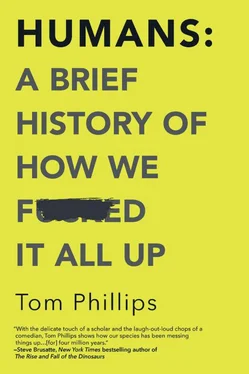Tom Phillips - Humans - A Brief History of How We F*cked It All Up
Здесь есть возможность читать онлайн «Tom Phillips - Humans - A Brief History of How We F*cked It All Up» весь текст электронной книги совершенно бесплатно (целиком полную версию без сокращений). В некоторых случаях можно слушать аудио, скачать через торрент в формате fb2 и присутствует краткое содержание. Город: Toronto, Год выпуска: 2019, ISBN: 2019, Издательство: Hanover Square Press, Жанр: История, Юмористические книги, на английском языке. Описание произведения, (предисловие) а так же отзывы посетителей доступны на портале библиотеки ЛибКат.
- Название:Humans: A Brief History of How We F*cked It All Up
- Автор:
- Издательство:Hanover Square Press
- Жанр:
- Год:2019
- Город:Toronto
- ISBN:978-1-48805-113-5
- Рейтинг книги:4 / 5. Голосов: 1
-
Избранное:Добавить в избранное
- Отзывы:
-
Ваша оценка:
- 80
- 1
- 2
- 3
- 4
- 5
Humans: A Brief History of How We F*cked It All Up: краткое содержание, описание и аннотация
Предлагаем к чтению аннотацию, описание, краткое содержание или предисловие (зависит от того, что написал сам автор книги «Humans: A Brief History of How We F*cked It All Up»). Если вы не нашли необходимую информацию о книге — напишите в комментариях, мы постараемся отыскать её.
Humans: A Brief History of How We F*cked It All Up — читать онлайн бесплатно полную книгу (весь текст) целиком
Ниже представлен текст книги, разбитый по страницам. Система сохранения места последней прочитанной страницы, позволяет с удобством читать онлайн бесплатно книгу «Humans: A Brief History of How We F*cked It All Up», без необходимости каждый раз заново искать на чём Вы остановились. Поставьте закладку, и сможете в любой момент перейти на страницу, на которой закончили чтение.
Интервал:
Закладка:
Our apparent desire to introduce new species where they’ve no right to be doesn’t even stop at species that already exist: sometimes we manage to create whole new species. That’s what happened in 1956 when the Brazilian scientist Warwick Estevam Kerr imported some African queen bees from Tanzania, in an effort to cross-breed them with European bees—the hope being that their combined traits would produce a species better suited to the Brazilian environment.
Unfortunately, after a year of breeding experiments, the thing that was always going to happen happened. A beekeeper working at Kerr’s lab in Rio Claro, a city to the south of São Paulo, had a very bad day on the job. Twenty-six of the Tanzanian queen bees escaped, followed closely by their personal swarms of European bees, and set up home in Brazil. The queens started breeding indiscriminately with any male bees they came across, producing hybrid strains with several different species. These new “Africanized” bees started spreading rapidly across South America, then Central America and then into the USA. They’re actually smaller and have less venom than the bees that came before them, but they are way more aggressive at defending their hives—producing up to ten times the number of stings. As many as a thousand people have died as a result of those stings, which is why the bees have ended up with the nickname “killer bees.” Which is a bit unfair. They’re just misunderstood.
But in the annals of humans learning the very hard way that ecosystems are complicated and that messing with the delicate balance of nature will come back to bite you, two stories stand out above all else. On different sides of the world, several decades apart, a fanatical dictator and an eccentric literature lover made mirror-image mistakes that had profound consequences. Both of their mistakes came from the same source: they radically underestimated birds.
Mao Zedong’s Four Pests campaign has to rank as the most disastrous entirely successful public health policy ever. It pulled together every part of society to meet its goals, which it surpassed to an astonishing degree—and half of those goals almost certainly resulted in major widespread improvements to the health of the nation. Two out of four isn’t bad, you might think.
The trouble is that the fourth goal resulted in tens of millions of deaths.
The problem stems from that same failure to realize that ecosystems are complicated and unpredictable. Oh yeah, let’s just add a species here, maybe trim a couple of species there, we think. That’ll make everything better. At which point Unintended Consequences rocks up with her pals Knock-On Effects and Cascading Failure and throws a hubris party.
When Chairman Mao’s communists took power in China in late 1949, the country was in the grip of a medical crisis. Infectious diseases, from cholera to plague to malaria, were running rife. If Mao’s goal of rapidly transforming the country from a largely agrarian nation only a few decades out of feudalism into a modern industrial powerhouse were to be met, something would have to be done.
Some of the solutions were obvious and sensible—mass vaccination programs, improved sanitation, that sort of thing. The problems started when Mao decided to focus on blaming animals for the country’s woes.
Mosquitoes spread malaria, rats spread plague; that much was pretty undeniable. And so a nationwide plan to reduce their numbers was hatched. Unfortunately, Mao didn’t stop there. If it had just been a Two Pests campaign, then things might have worked out okay. But Mao decided (without bothering to do anything like, you know, ask experts their opinion or anything) to add in two other species, as well. Flies were to be wiped out, on the grounds that flies are annoying. And the fourth pest? Sparrows.
The problem with sparrows, the thinking went, was that they ate grain. A single sparrow could eat as much as 4.5 kilograms of grain every single year—grain that could be used instead to feed the people of China. They did the math and determined that 60,000 extra people could be fed for every million sparrows that were eliminated. Who could argue with that?
The Four Pests campaign began in 1958, and it was a remarkable effort. A countrywide poster campaign demanded that every citizen, from the youngest to the oldest, do their duty and kill the shit out of as many animals as possible. “Birds,” it was declared, “are public animals of capitalism.” The people were armed with everything from flyswatters to rifles, with schoolchildren being trained in how to shoot down as many sparrows as possible. Jubilant sparrow-hating crowds took to the streets waving flags as they joined battle with the birds. Sparrows’ nests were destroyed and their eggs smashed, while citizens banging pots and pans would drive them from trees so they could never rest until, exhausted, they fell dead from the sky. In Shanghai alone, it was estimated that almost 200,000 sparrows died on the first day of hostilities. “No warrior shall be withdrawn,” the People’s Daily wrote, “until the battle is won.”
The battle was, indeed, won. In terms of achieving its stated goals, it was a triumph—an overwhelming victory for humanity against the forces of small animals. In total, the Four Pests campaign is estimated to have killed 1.5 billion rats, 11 million kilograms of mosquitoes, 100 million kilograms of flies… and a billion sparrows.
Unfortunately, it quickly became apparent what the problem with this was: those billion sparrows hadn’t just been eating grain. They’d also been eating insects. In particular, they ate locusts.
Suddenly freed from the constraints of a billion predators keeping their numbers down, the locusts of China celebrated like it was New Year every day. Unlike sparrows—who’d eat a bit of grain here and there—the locusts tore through the crops of China in vast, relentless devouring clouds. In 1959, an actual expert (ornithologist Tso-hsin Cheng, who had been trying to warn people how bad an idea this all was) was finally listened to, and sparrows were replaced on the list of official pests-we-want-to-kill by bedbugs. But by then it was too late; you can’t just replace a billion sparrows on a whim once you’ve wiped them out.
To be clear, the destruction of the sparrows wasn’t the only cause of the great famine that struck China in the years between 1959 and 1962—a perfect storm of terrible decisions helped to cause it. A Party-mandated shift from traditional subsistence farming to high-value cash crops, a suite of destructive new agricultural techniques based on the pseudoscience of the Soviet biologist Trofim Lysenko and the central government appropriating all produce and diverting it away from local communities each played its part. Incentives that pushed officials at every level to report positive results led to the delusion on the part of the country’s leaders that, basically, Everything Was Fine and the nation had more than enough food. This meant that when several years of terrible weather hit (flooding in some parts of the country, drought in others), there were no reserves to see them through.
But all that sparrow-murdering, and the subsequent obliteration of crops by the real pests, was a crucial component of the disaster that struck. Estimates of the number of deaths in the famine range from 15 million to 30 million, and the fact that we don’t even know whether or not 15 million human beings died just adds an extra layer of horror to it.
You’d hope that the basic lesson of this—don’t fuck with nature unless you’re very, very certain what the consequences will be, and even then it’s probably still not a good idea—would have stuck. But that seems unlikely. In 2004, the Chinese government ordered the mass extermination of mammals from civet cats to badgers in response to the outbreak of the SARS virus, suggesting that humans’ capacity for learning from their mistakes remains as tenuous as ever.
Читать дальшеИнтервал:
Закладка:
Похожие книги на «Humans: A Brief History of How We F*cked It All Up»
Представляем Вашему вниманию похожие книги на «Humans: A Brief History of How We F*cked It All Up» списком для выбора. Мы отобрали схожую по названию и смыслу литературу в надежде предоставить читателям больше вариантов отыскать новые, интересные, ещё непрочитанные произведения.
Обсуждение, отзывы о книге «Humans: A Brief History of How We F*cked It All Up» и просто собственные мнения читателей. Оставьте ваши комментарии, напишите, что Вы думаете о произведении, его смысле или главных героях. Укажите что конкретно понравилось, а что нет, и почему Вы так считаете.












